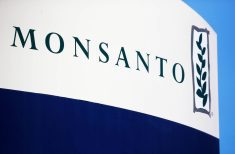Fewer companies means more innovation.
That’s the world according to Robert Fraley, Monsanto’s chief technology officer and executive vice-president, who says biotechnology companies need to consolidate to remain effective.
“Consolidation is both needed and healthy in order to be able to provide the kind of investments that you need in cutting-edge biology and data science tools,” said Fraley, only one day after defending the proposed US$66-billion merger between Monsanto and Bayer to U.S. Senate’s Judiciary Committee.
“One of the points I made when I testified yesterday, is that I feel Monsanto is a privileged company, we have the ability to spend a billion and a half dollars a year on R&D,” said Fraley, following a presentation at the Agricultural Biotechnology International Conference in Fargo last week. “But you know if you compare that to the leading innovators in data science like a Google or an Amazon… or a pharmaceutical company like Merck or Pfizer, who’s spending 10 billion on genome sequencing and analysis, I think it’s pretty clear for agriculture to reach what it needs to achieve the kind of innovations we need to make, we need to scale up.”
Read Also

Tie vote derails canola tariff compensation resolution at MCGA
Manitoba Canola Growers Association members were split on whether to push Ottawa for compensation for losses due to Chinese tariffs.
If the Bayer-Monsanto deal goes ahead, it’s possible that the global marketplace will be left with only three large biotechnology companies. Dow and DuPont are also heading towards a merger, as are ChemChina and Syngenta. Members of the U.S. Senate and American farm lobby groups have raised concerns that this will reduce competition, raise prices and curtail innovation, noting that it would mean that 70 per cent of global pesticide production and development would be under the control of only three companies.
Not so, said Fraley.
“When you actually think about it, agriculture is a highly fragmented industry. Just think of all of the seed companies and of the equipment companies, all of the retailers, all of the grain-handling companies, all the companies that we don’t know who they are in India and China, this is a super-fragmented industry,” he said.
If the proposed Bayer-Monsanto merger goes ahead, it will also leave nearly all canola traits in the hands of one company.
“The recent announcement of a merger agreement between Bayer and Monsanto is a cause of serious concern to Canada’s canola farmers. The merger would combine two leading players in Canada’s agriculture industry, significantly reducing competition and consolidating market share in the canola seed, trait and crop protection business,” said the Canadian Canola Growers Association in a recent press release.
While Fraley was circumspect in responding to questions about whether or not a merged company would have to divest itself of some canola-related assets to gain regulatory approval, he did say that some tweaking might occur during the regulatory process.
“Clearly there is a couple of areas that are going to go through the regulatory review process and those will be the areas where if there are fixes that need to be made, or decisions that need to be made, it’s still a very small part of what drives the business combination,” he said, adding that change can be difficult for farmers to accept.
“Look, I grew up on a farm and I know that for a lot of farmers, just like for anybody else, change is a little disconcerting,” Fraley said. “I appreciate that and I spend a lot of time talking to growers; on the other hand, I’ve got a lot of phone calls and a lot of folks saying this is great, we need more innovation if I’m going to stay in business.”















